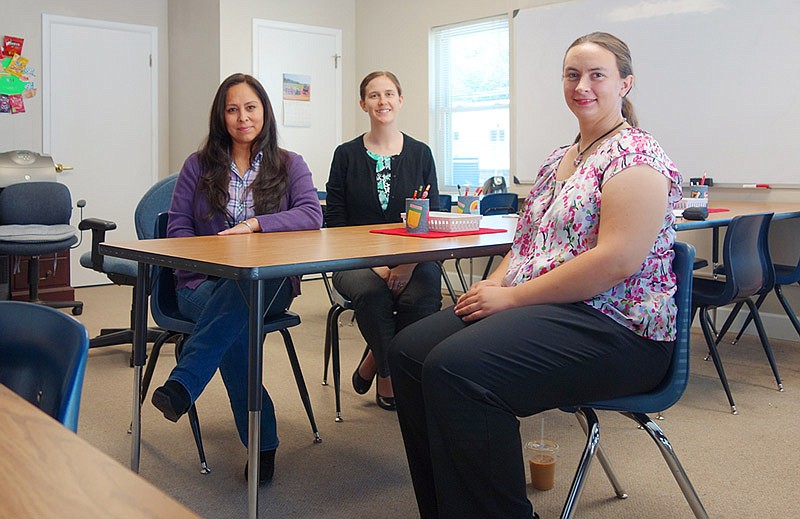School doesn't have to stop when someone becomes an adult - sometimes it can't.
Adult educational needs can take the form of needing a high school degree equivalent or learning to become proficient in the English language. These are the kinds of services Stephany Schler oversees as coordinator of Jefferson City Public Schools' Adult Education and Literacy program.
The program, grant-funded through the Missouri Department of Elementary and Secondary Education and hosted by the local school district, serves about 500 people each year between its high school equivalency and English Language Acquisition classes, Schler explained.
Jessie Lee and Ana Elia Perez are two students served by the program.
Lee has passed her High School Equivalency Test - what used to be known in Missouri as the GED test.
Lee's father served in the Navy, and she was home-schooled for high school. However, her parents didn't correctly certify her diploma, which eventually made it invalid, she explained.
She consulted with a job center and determined her best option for advancing her career was to pass a HiSET.
A recent letter from Ann McCauley, president of the Missouri Adult Education and Literacy Administrators' Association, to Gov. Eric Greitens notes "by next year, only 10 percent of jobs will be open to those who fail to complete high school and only 28 percent will be open to those with only a high school diploma."
McCauley's letter inviting Greitens to visit an adult education classroom during last week's National Adult Education and Family Literacy Week also noted there are 28 adult education programs in the state, with more than 250 class sites. Schler said there are local sites in California, Eldon, Fulton and Versailles, in addition to Jefferson City.
Adult education and literacy classes in Missouri are provided free to students, who also do not have to pay for textbooks. McCauley's letter notes the average cost per year to provide the classes is less than $700 per student. Eighty-nine percent of students who take the HiSET pass.
Lee works two jobs now, and the program worked around her schedule. She said she'd like to go to college, maybe Columbia College. Her professional interests include music and business, and maybe culinary skills in the future.
"At first, it was a little funny," she said of studying for the HiSET in a classroom with people of a range of ages from late teens to 30s or 40s. "But I just figured we're in for the same thing."
Instruction was a mix of individualized attention and group work, she said.
As part of attaining her high school equivalency degree, she will participate in a cap and gown ceremony at the Miller Performing Arts Center at the end of the year.
"I'm not a very good crowd person, so probably I'll be very nervous," she said, although she plans to invite her family to the ceremony. Her family lives in Virginia, but her "church family" is at Fairgrounds Church of Christ. She thanks God in addition to people in her life for her success.
Perez and her family followed a career opportunity away from home, but she realized once she got to the United States that she needed to expand her English language skills to enjoy the kind of life she had in Mexico.
Her husband is an electrical engineer with ABB, and a few years ago, the company offered to transfer him from Mexico City to Missouri's capital for his job. The couple decided Jefferson City would be a good place for their children to grow up.
She and her husband have two boys, 8 and 12 years old, and their mom thinks it was easier for them to learn English than her.
"The first year I felt very frustrated because I couldn't understand; I couldn't do many things," she said.
In Mexico, Perez had been independent, able to go out with friends or go see a movie. But without English language skills in the United States, "I had to be at home all the time. I was dependent (on) my husband," she said.
If she had to go see a doctor, her husband had to come with her to translate. "Now, I can do it for myself," she said.
After almost two years in the ELA program, she can confidently and effectively make telephone calls, send emails and attend meetings at her children's school.
She said her classes through the ELA program have had people from Honduras, Guatemala, Colombia, Ukraine, Lithuania, China and India, and getting to know them has been an added joy.
Schler said much of people's interest in the ELA program has been through word of mouth. The high school equivalency program has been advertised with flyers, job centers, resource fairs and post-prison societal re-entry programs.
Perez said she would like to be able to teach English in the United States herself. She also wants to pass the TOEFL test of English as a foreign language, which could open up more career opportunities for her in Mexico, where she had been a secretary.
Her next linguistic challenge might be to get her children to keep up their Spanish, which she doesn't want them to forget, she said.

